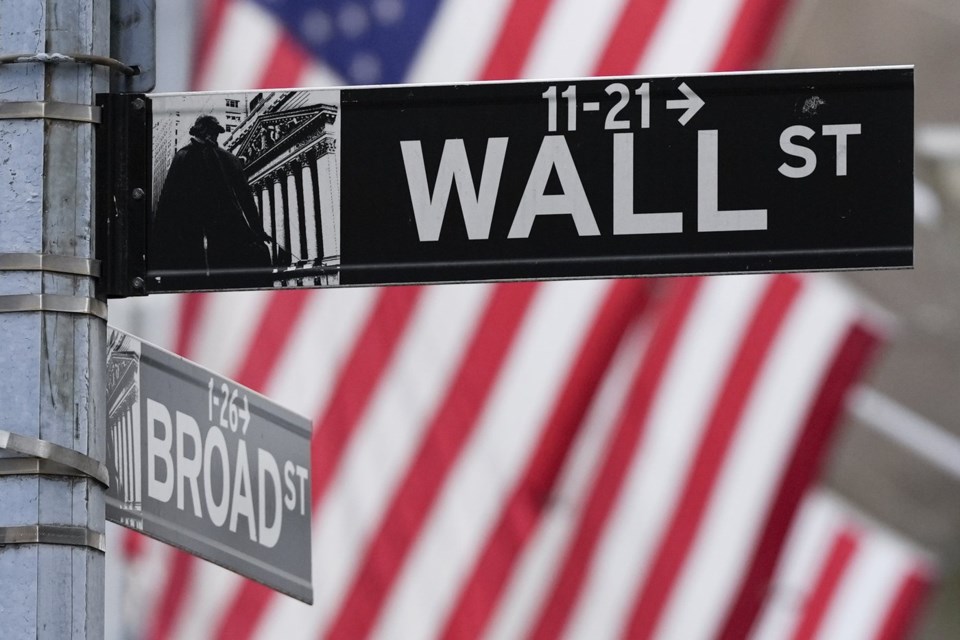NEW YORK (AP) — U.S. stocks are falling Wednesday after a report said inflation is unexpectedly getting worse for Americans.
The S&P 500 was 0.7% lower in midday trading. The Dow Jones Industrial Average was down 397 points, or 0.9%, as of 11:15 a.m. Eastern time, and the Nasdaq composite was 0.5% lower. All three indexes have been unsteady since opening sharply lower, with the S&P 500 down as much as 1.1% and as little as 0.3% in the morning.
Treasury yields also climbed in the bond market, cranking up the pressure on financial markets after a report said U.S. consumers had to pay prices for eggs, gasoline and other costs of living that were 3% higher overall in January than a year earlier. That was worse than the 2.9% inflation rate of December, which is what economists expected to see again.
The inflation report suggests not only that pressure on U.S. households’ budgets is amplifying but also that traders on Wall Street were correct to forecast the Federal Reserve will deliver less relief for Americans through lower interest rates this year.
The Fed had cut its main interest rate sharply from September through the end of last year, moves that try to make borrowing cheaper, help the economy and boost prices for stocks, bonds and other investments. But the Fed warned at the end of 2024 it may not cut rates by as much in 2025 as earlier expected because of worries about inflation staying stubbornly high. Its goal is to keep inflation at 2%, and lower rates can give inflation more fuel.
Some investors were betting on the Fed not cutting rates at all in 2025, even before Wednesday’s report on the consumer price index, or CPI.
“The hotter than expected CPI confirms investors’ anxiety regarding too-hot inflation that will keep the Fed on the sidelines,” said Sameer Samana, head of global equities and real assets at Wells Fargo Investment Institute.
And January’s reading doesn’t account for any of the tariffs that President Donald Trump ’ has recently announced, which economists expect will raise prices for imports further. Tariffs “will make their impact felt later in the year,” Samana said.
Following January’s discouraging inflation data, traders are betting on a nearly 29% chance that the Fed will not cut rates at all this year, according to data from CME Group. That’s up from a less than 20% chance seen the day before.
Such expectations sent the yield on the two-year Treasury up to 4.37% from 4.29% late Tuesday. The 10-year Treasury yield, which also takes longer-term economic growth and other factors into consideration, jumped even more sharply. It rose to 4.65% from 4.54%.
When a 10-year Treasury, which is seen as one of the safest investments possible, is paying that much in interest, investors are less likely to pay high prices for stocks, which carry a higher risk of seeing their prices go to zero. That puts downward pressure on U.S. stock prices that critics say already look too expensive after running to repeated records last year, with the latest for the S&P 500 coming last month.
Smaller companies took some of the worst hits, and the Russell 2000 index of smaller stocks fell a market-leading 1.4%. They can feel the harshest pain from higher interest rates, in part because of the need for many to borrow to grow, along with their stocks often being seen as riskier than others.
One of the few ways companies have to counteract such downward pressure on their stock prices is to deliver stronger profits.
CVS Health did just that, and its stock jumped 13.6% after easily topping Wall Street’s revenue and profit expectations for the latest quarter.
But even doing that isn’t always enough. Ride-hailing app Lyft tumbled to a 6.3% loss despite reporting stronger profit than Wall Street expected. Lyft’s revenue for the final three months of 2024 fell just short of analysts' forecasts.
Homebuilders, housing-related retailers and other companies that can feel pain from mortgage rates staying higher also weighed heavily on the market. Home Depot fell 2.9%, Builders FirstSource sank 4.6% and Lennar dropped 4%.
Owners of real estate likewise fell sharply. Boston Properties, which owns buildings in San Francisco, Boston and other big cities, fell 2.9%.
Shares of Frontier Group Holdings, the parent company of Frontier Airlines, lost 1.9% after Spirit Airlines rejected a third takeover bid from the budget rival. Spirit said that it would focus on its own plan to emerge from the protection of a U.S. bankruptcy court and stabilize its finances.
In stock markets abroad, indexes were mostly higher across much of Europe and Asia.
___
AP Business Writers Matt Ott and Yuri Kageyama contributed.
Stan Choe, The Associated Press



